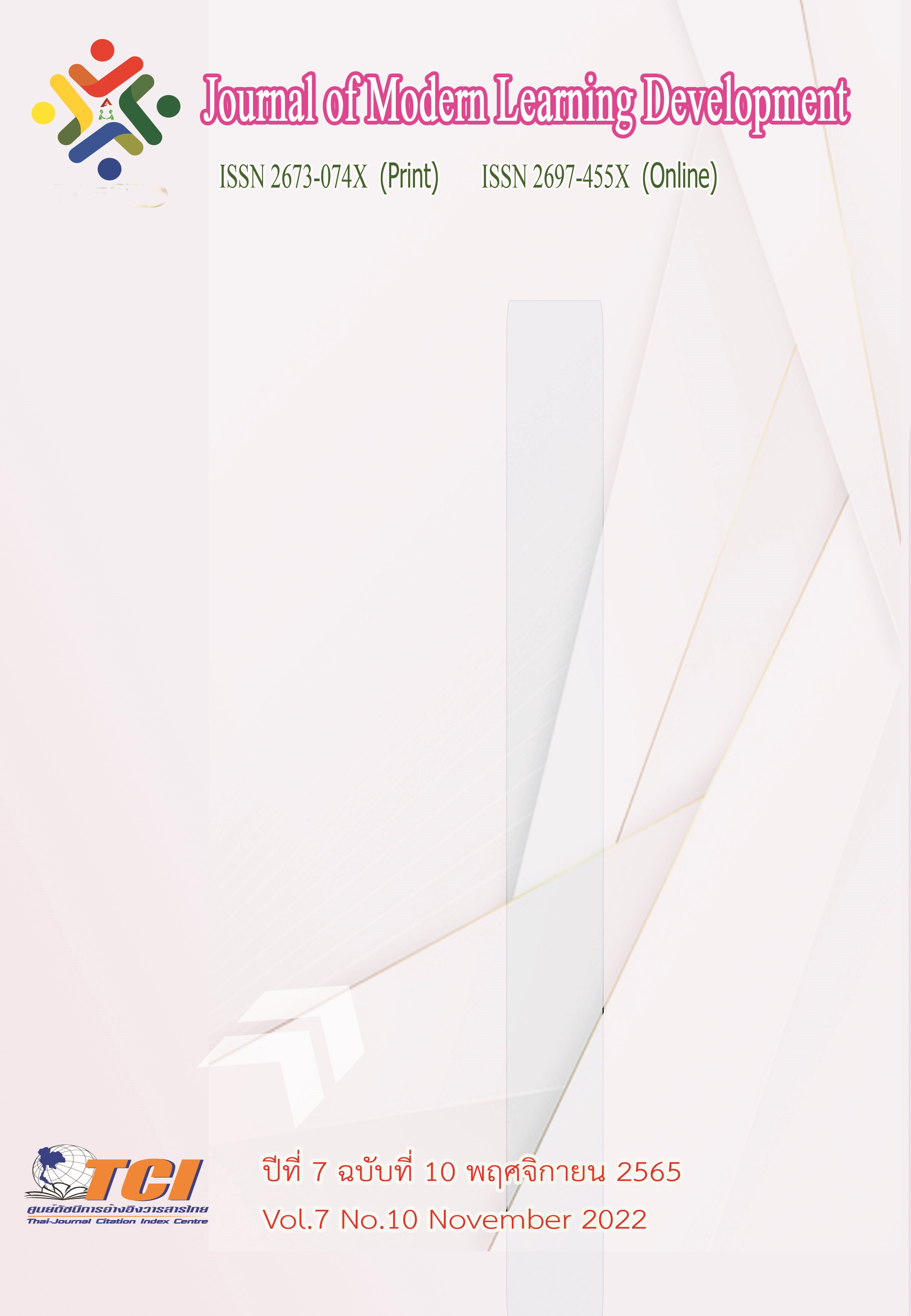การพัฒนารูปแบบการสอนวิทยาศาสตร์เพื่อพัฒนากระบวนการคิดเชิงระบบ สำหรับนักเรียนชั้นมัธยมศึกษาปีที่ 3
Main Article Content
บทคัดย่อ
การวิจัยครั้งนี้มีวัตถุประสงค์เพื่อพัฒนารูปแบบการสอนวิทยาศาสตร์เพื่อพัฒนากระบวนการคิดเชิงระบบสำหรับนักเรียนชั้นมัธยมศึกษาปีที่ 3 ประเมินประสิทธิภาพของรูปแบบการสอน เปรียบเทียบกระบวนการคิดเชิงระบบก่อนและหลังใช้รูปแบบการสอน เพื่อศึกษาพฤติกรรมและพัฒนาการของนักเรียน ด้านกระบวนการคิดเชิงระบบโดยใช้กลุ่มตัวอย่างที่ศึกษาได้แก่ นักเรียนชั้นมัธยมศึกษาปีที่ 3 ที่ใช้ในการวิจัยเป็นนักเรียนชั้นมัธยมศึกษาปีที่ 3/2 ที่กำลังศึกษาใน ภาคเรียนที่ 2 ปีการศึกษา 2561 โรงเรียนบ้านท่าดินแดง อำเภอสังขละบุรี จังหวัดกาญจนบุรี สังกัดสำนักงานเขตพื้นที่การศึกษาประถมศึกษากาญจนบุรี เขต 3 จำนวน 27 คน ได้มาโดยการสุ่มแบบกลุ่ม (Cluster Random Sampling) ด้วยวิธีการจับสลาก โดยใช้ห้องเรียนเป็นหน่วยในการสุ่ม เครื่องมือที่ใช้ในการวิจัยประกอบด้วยเครื่องมือที่ใช้ในการวิจัยประกอบด้วย 1) รูปแบบการสอนวิทยาศาสตร์เพื่อพัฒนากระบวนการคิดเชิงระบบสำหรับนักเรียนชั้นมัธยมศึกษาปีที่ 3 2) แผนการจัดการเรียนรู้ จำนวน 9 แผน3) แบบประเมินพฤติกรรมกระบวนการคิดเชิงระบบ 4) แบบวัดกระบวนการคิดเชิงระบบ 5) แบบสอบถาม ความพึงพอใจที่มีรูปแบบการสอนวิทยาศาสตร์เพื่อพัฒนากระบวนการคิดเชิงระบบ สถิติที่ใช้ในการวิเคราะห์ข้อมูลได้แก่ ค่าเฉลี่ย ส่วนเบี่ยงเบนมาตรฐาน เกณฑ์ประสิทธิภาพและการทดสอบ ค่าที (t-test) ผลการวิจัย พบว่า 1) ได้รูปแบบการสอนวิทยาศาสตร์เพื่อพัฒนากระบวนการคิดเชิงระบบสำหรับนักเรียนชั้น มัธยมศึกษาปีที่ 3 ที่มี 4 องค์ประกอบคือ 1) ขั้นตอนการจัดกิจกรรม (Syntax) นำเสนอเป็น 6 ขั้น (phase) ประกอบด้วย ขั้นที่ 1 นำเสนอสถานการณ์ ขั้นที่ 2 พัฒนาแนวทางการคิด ขั้นที่ 3 พิจารณาปัญหา ขั้นที่ 4 สนทนาแลกเปลี่ยน ขั้นที่ 5 เรียนรู้ผลงานกลุ่ม ขั้นที่ 6 สรุปร่วมกัน 2) ระบบทางสังคม (Social System) 3) หลักการตอบสนอง (Principles of Reaction) และ 4) ระบบที่นำมาสนับสนุน (Support System) 2) รูปแบบการสอนเพื่อพัฒนากระบวนการคิดเชิงระบบสำหรับนักเรียน ชั้นมัธยมศึกษาปีที่ 3 มีความสอดคล้องและความเหมาะสมอยู่ในระดับมากและมีประสิทธิภาพ 81.06/86.85 3) กระบวนการคิดเชิงระบบของนักเรียนหลังใช้รูปแบบการสอนสูงกว่าก่อนใช้รูปแบบการสอนเพื่อพัฒนากระบวนการคิดเชิงระบบอย่างมีนัยสำคัญทางสถิติที่ระดับ .05และ 4) ผลความพึงพอใจของนักเรียนที่มีต่อรูปแบบการสอนวิทยาศาสตร์เพื่อพัฒนากระบวนการคิดเชิงระบบ สำหรับนักเรียนชั้นมัธยมศึกษาปีที่ 3 ด้านการจัดกิจกรรมการเรียนการสอนในภาพรวมนักเรียนมี ความคิดเห็นอยู่ในระดับมากที่สุด
Article Details
เอกสารอ้างอิง
กระทรวงศึกษาธิการ. (2551). หลักสูตรแกนกลางการศึกษาขั้นพื้นฐาน พุทธศักราช 2551. กรุงเทพมหานคร: โรงพิมพ์ ลาดพร้าว.
กระทรวงศึกษาธิการ. (2552). หลักสูตรแกนกลางการศึกษาขั้นพื้นฐาน พุทธศักราช 2551. กรุงเทพมหานคร: โรงพิมพ์สหกรณ์ การเกษตรแห่งประเทศไทย.
ชัยยงศ์ พรหมวงศ์. (2531). ชุดการสอนระดับประถมศึกษา. (เอกสารประกอบการสอน). กรุงเทพมหานคร: ภาพพิมพ์.
ทิศนา แขมมณี. (2555). ศาสตร์การสอน: องค์ความรู้เพื่อการจัดกระบวนการเรียนรู้ที่มีประสิทธิภาพ. (พิมพ์ครั้งที่ 15). กรุงเทพมหานคร: จุฬาลงกรณ์มหาวิทยาลัย.
บุญชม ศรีสะอาด. (2553). การวิจัยเบื้องต้น. (พิมพ์ครั้งที่ 8). กรุงเทพมหานคร: สุวีริยาสาส์น.
บุญเลี้ยง ทุมทอง. (2553). การพัฒนารูปแบบการจัดการเรียนรู้เพื่อพัฒนากระบวนการคิดเชิงระบบวิชาคณิตศาสตร์ ระดับช่วงชั้นที่ 4. วิทยานิพนธ์ศึกษาศาสตรดุษฎีบัณฑิต สาขาวิชาหลักสูตรและการสอน. บัณฑิตวิทยาลัย: มหาวิทยาลัยขอนแก่น.
บุญธรรม กิจปรีดาบริสุทธิ์. (2543). สถิติวิเคราะห์เพื่อการวิจัย. กรุงเทพมหานคร: คณะสังคมศาสตร์และ มนุษย์ศาสตร์มหาวิทยาลัยมหิดล.
ประสิทธิ์ ศรเดช. (2553). การพัฒนารูปแบบการสอนเพื่อฝึกทักษะทางคณิตศาสตร์สำหรับนักเรียนระดับประถมศึกษา. วิทยานิพนธ์การศึกษาดุษฎีบัณฑิต สาขาวิชาหลักสูตรและการสอน. บัณฑิตวิทยาลัย: มหาวิทยาลัยบูรพา.
พรชัย พิทักษ์พรชัย. (2557). การพัฒนาประสิทธิผลทางการเรียนวิชาวิทยาศาสตร์ เรื่องการแยกสารสำหรับนักเรียนชั้นมัธยมศึกษาปีที่ 2 โดยใช้กระบวนการสืบเสาะหาความรู้ในการทดลองเสมือน. วารสารศึกษาศาสตร์ มหาวิทยาลัยบูรพา. 25 (2), 40-54.
มกราพันธุ์ จูฑะรสก. (2551). การคิดอย่างเป็นระบบ: การประยุกต์ใช้ในการเรียนการสอน. (พิมพ์ครั้งที่ 2). กรุงเทพมหานคร: โครงการสวัสดิการวิชาการ สถาบันพระบรมราชนก.
มนตรี แย้มกสิกร. (2546). การพัฒนารูปแบบการสอนเพื่อพัฒนากระบวนการคิดเชิงระบบของนิสิตระดับ ปริญญาตรี สาขาเทคโนโลยีทางการศึกษา. วิทยานิพนธ์การศึกษาดุษฎีบัณฑิต สาขาการวิจัยและพัฒนาหลักสูตร. บัณฑิตวิทยาลัย: มหาวิทยาลัยศรีนครินทรวิโรฒประสานมิตร.
วชิระ พรหมวงศ์. (2557). การพัฒนาระบบการเรียนการสอนอิงภูมิปัญญาท้องถิ่นสำหรับนักเรียนประถมศึกษา. วารสารศึกษาศาสตร์ มหาวิทยาลัยบูรพา. 25 (2), 161-171.
วิลาวัลย์ โพธิ์ทอง. (2555). เครื่องมือช่วยคิดเพื่อพัฒนาการคิดเชิงระบบ. วารสารศึกษาศาสตร์ มหาวิทยาลัย ศิลปากร. 10 (2), 30-42
สุนทร บำเรอราช. (2545). การพัฒนาและการใช้หลักสูตร. ชลบุรี: คณะศึกษาศาสตร์ มหาวิทยาลัยบูรพา.
สุรางค์ โค้วตระกูล. (2553). จิตวิทยาการศึกษา. (พิมพ์ครั้งที่ 4). กรุงเทพมหานคร: จุฬาลงกรณ์มหาวิทยาลัย.
อัมพร ม้าคนอง. (2553). การพัฒนาทักษะกระบวนการทางคณิตศาสตร์ :การพัฒนาเพื่อพัฒนาการ. กรุงเทพมหานคร: คณะครุศาสตร์ จุฬาลงกรณ์มหาวิทยาลัย
Brauer, C., Grady, F., Matthew, K., & Wilhite, S. (1997). The effect of problem – solving on academic achievement in elementary education. Master’s Action research Project Saint Xavier University and IRI/Skyling field – base Master’s Program.
Johnson, D. W., & Johnson, R. T. & Holuber, E.J. (1994). The nuts and bolts of cooperative learning. Edina, Minnesota: Interaction Book Company.
Joyce, B., & Weil, M. (2004). Models of teaching. (5th ed.). London: Allyn and Bacon.
Joyce, B., & Weil, M., & Calhoun, E. (2004). Models of teaching. (7th ed.). Boston: Pearson Education.
Kreuzer, J.M.G. (2001). Foreword: System dynamics in education. System Dynamic. 9 (2) (Summer 1983).
McMillan, J.H. (2001). Research in education: A conceptual introduction. New York: Longman.
Rogers, C.R. (1969). Freedom to learn. Columbus, Ohio: Charles E. Merrill Publishing Company
Schunk, D. H. (1996). Learning theories. (2th ed.). Englewood Cliffs: Prentice-Hall.
Woolfolk, A. (2008). Educational psychology. (10th ed.). Boston: Pearson Education.
Yang Lizhou. (2555). การพัฒนารูปแบบการสอนอ่านภาษาไทยเพื่อความเข้าใจ สำหรับนักศึกษามหาวิทยาลัย ชนชาติยูนนาน ตามแนวการสอนแบบ ACTIVE Reading และหลักการเรียนรู้แบบร่วมมือ. วิทยานิพนธ์ การศึกษาดุษฎีบัณฑิต สาขาวิชาหลักสูตรและการสอน. บัณฑิตวิทยาลัย: มหาวิทยาลัยบูรพา.


